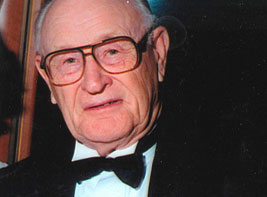
Conrad Lohoefer
 |
After his service in World War II, Conrad Lohoefer, BJ ’49, hoped to attend the University of Missouri-Columbia—but a few obstacles stood in his way. "I had a hard time getting into MU. So many people were going to college after the war," Conrad said. His residency was an issue because he was born and raised in Amarillo, Texas, and third preference for acceptance was given to out-of-state veterans. In addition, he needed proof of in-state housing prior to enrollment.
One Sunday evening, Conrad was home with his parents and a friend of theirs. Conrad's parents mentioned his desire to attend MU and how the housing issue was a concern. Their family friend stated she knew someone who taught in Columbia, Missouri, but Conrad didn't think much of her offer as he headed to bed. The next morning, the same friend contacted the teacher, who explained she was renting out a place near campus (Worley Street) for $35 per month. Conrad and his buddy drove to Columbia the next day. With a letter of recommendation and approved housing, both young men were able to enroll for classes.
Years before, Conrad knew he would go on to receive a degree in higher education. "I was an only child. My childhood was normal and lots of fun. Dad always told me I was going to college. It was all we ever talked about. We didn't know where, but I was going. My dad didn't graduate high school, bless his heart."
Conrad credits his educators as influential people throughout his adolescent years. "Our Sunday School teacher taught us everything." His high school teacher also helped him develop a fondness for journalism. "She said, 'I ought to go to MU' for journalism," Conrad said, as his two favorite subjects were history and a reporting class. He graduated high school at 18 years old and one week later was sent his first draft notice. Since Conrad was enrolled in community college, he was given a one-year deferment.
Conrad's deferment ended and he left to serve in World War II. "I was drafted Army like everyone back then. We were divided up and the sergeant asked which branch I wanted. It was an unusual approach, but I ended up Army Air Force. I became a flight engineer for BC-17s and flew 35 missions over Germany," Conrad said.
After his service and with the help of the G.I. Bill, Conrad finally went on to attend MU. "Like 99 percent of college students at the time, I was broke," Conrad said. He was allotted $75 each month for his housing allowance from the G.I. Bill. Each month $17.50 went to his rent and $35 went to his meal plan [ticket] at the campus dining hall, "So I would always have a place to sleep and something to eat for the next month. The G.I. Bill is the greatest thing this country ever did."
The basement of Jesse Hall held a Message Center where students were permitted to work. For 35 cents an hour, Conrad would bring messages to faculty and staff on campus. "You could work between classes or days you didn't have class," Conrad said. He was able to make an additional $17 to $20 every month.
With his additional income, Conrad and friends would visit a local ice cream parlor near Stephens College. "Stephens College threw the best parties," Conrad said. "They always had great dances and would book big names. Skitch Henderson performed and flew in for the concert on his own P-51."
Conrad graduated with a year and a half remaining on his G.I. Bill. "Going to MU was the best thing I ever did. I don't have any regrets. I debated on a master's degree, but I left at midterm and started looking for a job instead," Conrad said.
After graduation, Conrad received a call from MU about a job offer in Oregon as a copywriter. He got his affairs in order and moved. "It was a great job. I worked on newspapers in Oregon and Texas until 1957, when I entered public relations," Conrad said. In 1951, while attending Sunday School in Texas, he met his future wife. The two married and had five children together.
As for MU's future, Conrad would be happy to see more printed publications. "I hope to see a nicer printed weekly newspaper. It was one of my ambitions, but I never got to work on it. I cringe to think about print being obsolete or people trying to market only with digital mediums."
"It's been a good life. I wouldn't trade it for anything." He and his wife were married 61 years at her passing in 2012. Today, his five children, nine grandchildren, and his great-grandson (named after him) all make time to visit. "I am very fortunate," Conrad said.
Conrad is a member of the MU Legacy Society, Jefferson Club, and the Walter Williams Society.
© Pentera, Inc. Planned giving content. All rights reserved.
Disclaimer